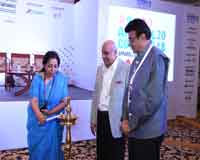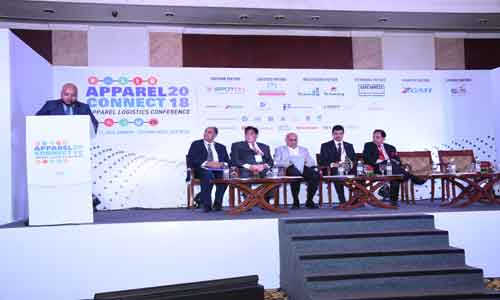FW
Garment products dominate across all textile businesses, with sports apparel, textiles for garments and fast fashion topping the growth applications leader board.
This data was collected throughout 2017 at FESPA events and from association members in Europe, Eurasia, Mexico, Brazil, Thailand and South Africa. Respondents include screen print businesses with a focus on textile applications, dedicated textile producers and direct-to-garment businesses.
Digital adoption for textile is slower than in other segments and production is still dominated by analogue processes across all textile-related segments.
Among printers focused on textiles, 56 per cent have made digital investments, and 19 per cent plan to do so in the next two years, aiming to reap the benefits of reduced time to market, customised creative collections, prototyping, and a positive impact on the environment by reducing water and energy consumption.
Production speed is an investment priority for 69 per cent of textile respondents, and 55 per cent want the ability to print directly onto untreated materials. These investments are motivated by brand owner demand for time-sensitive production that delivers supply chain improvements such as waste reduction, optimises response to seasonal peaks and enables local delivery.
Screen and textile printers expect digital’s contribution to textile printing revenues to grow by 12 per cent in the next two years.
The EU is Australia’s third largest trading partner.
EU’s exports to Australia are predominantly manufactured goods while Australia's exports to the EU are dominated by mineral commodities and agricultural products.
The EU is New Zealand’s second largest trading partner after Australia. New Zealand's exports to the EU are largely dominated by agricultural products while EU’s exports to New Zealand are focused on manufactured and industrial goods.
The EU cooperates closely with Australia and New Zealand on economic and trade policy issues in the framework of partnership agreements which were concluded respectively in 2008 and 2017.
The EU also has bilateral agreements with both countries on mutual recognition of some technical certificates which, by reducing the costs of testing and certifying of exports and imports, facilitate trade in industrial products. Although generally limited, trade barriers for some sectors, such as agriculture or textile products, remain quite substantial.
The EU has now opened talks with Australia and New Zealand, with any agreement designed to reduce existing barriers to trade, removing custom duties on goods, and giving better access for services and public procurement in Australia and New Zealand. The sectors likely to benefit the most from the FTAs are motor equipment, machinery, chemicals, processed foods and services.
Global denim manufacturer Wrangler recently joined the Cotton LEADS program.
The brand is committed to promoting soil health practices as a foundation for improving sustainability in the industry. It launched its sustainable cotton program in 2017 and aims to double its use of cotton acquired through the program by 2019.
Most recently, the brand published “Seeding Soil’s Potential.” This overview of 45 scientific reports definitively concludes that the practices of conservation tillage, cover crops and crop rotation result in greater crop resiliency and productivity, among a host of other benefits to the grower and the land.
Roian Atwood, Director-Sustainability, Wrangler,said, “Joining Cotton LEADS is an important step in building Wrangler’s program for sustainable U.S. cotton. Cotton LEADS has deep research on productivity within the industry, and we’re particularly interested in the program’s attention to soil health.”
Vietnam and China see huge potential for cooperation in economy, trade and investment.
China is currently Vietnam’s biggest trade partner, while Vietnam is China’s largest trader in ASEAN. Two-way trade in 2017 was up 30 per cent year-on-year and accounted for 22 per cent of Vietnam’s total import-export turnover.
Vietnam posted a trade deficit of 28 billion dollars with China in 2016. The figure was down to 22.7 billion dollars last year, a positive sign in improving the bilateral trade balance.
Bilateral trade is forecast to exceed 100 billion dollars this year.
In terms of investment, Chinese enterprises are intensifying investment in such fields as garments-textiles and mineral exploitation-processing in Vietnam. Last year, Chinese investors opened 284 new projects and added capital to 83 existing projects in the southeast Asian nation with a total capital of over 12 billion dollars.
With its open trade policy, China welcomes foreign businesses, including those from Vietnam, to bring into full play market opportunities to increase exports of high-value products to the country.
Chinese firms want to seek cooperation opportunities in garment and textiles, seafood and farm produce processing for export.
Bangladesh has become known as a hub of the garment manufacturing industry.
The United States is the second largest market for Bangladesh's readymade garment products.
Countries like Canada and Japan, from outside the EU bloc, also look to Bangladesh as a potential sourcing country for their readymade garment imports.
As a least developed country, Bangladesh enjoys many facilities offered by advanced economies.
One such facility is the GSP offered by the European Union. This scheme makes rooms for the export of Bangladeshi garment products with no or little tariff to EU countries.
Graduation to the group of developing countries is important, but what's more important is the consolidation of the position. Bangladesh made a mistake in depending too much on the WTO route for having market access. A country like Vietnam that liberalised its economy much later than Bangladesh has already negotiated more than a dozen free trade agreements, whereas Bangladesh has not signed a single one.
Unless it becomes a partner with other economies, Bangladesh will not receive the expected investment - be it from within or without.
Bangladesh can and should negotiate its own free trade agreements with trading partners and other interested countries.
Without a growth rate of 7.5 per cent or beyond, it cannot expect to consolidate its position as a developing country within the stipulated time.
Asia Pacific exporters are deeply concerned about a fall in business largely due to an increase in US protectionist measures and their potential for triggering a trade war with Asian countries.
The turnover will decline ten to 20 per cent due to uncertainty over any changes in trade agreements.
The worries come up at a year, 2018, when global GDP growth has been forecast to accelerate to 3.2 per cent – the strongest annual expansion since 2011.
More than half of the suppliers in China are pessimistic about potential export turnover losses due to the introduction of trade barriers such as tariffs or targeted restrictions.
The opinions of Chinese suppliers are shared by those in Indonesia (65 per cent), Taiwan (48 per cent) and Hong Kong (47 per cent). These are all economies with deeply intertwined trade relationships with China.
Suppliers focusing on domestic trade, however, consider the introduction of international trade barriers to be an opportunity for growth.
Despite concerns over the impact of protectionist trends on the Asia Pacific trade outlook, countries in the region are striving to reinforce trade ties with the rest of the world, increasingly turning to Australia for economic and trade cooperation.
This may explain why most Australian suppliers do not expect a negative impact on their businesses’ turnover in the coming months. Japanese suppliers share the same optimistic view.
Demand for textile colorants is anticipated to remain steady on account of growing applications in apparel and automotive industries.
Demand is anticipated to remain higher in developing countries, owing to low labor costs and infrastructure development.
By fiber type, cotton remains the largest segment, followed by nylon and polyester. Among other fiber types, acrylic is projected to grow at the fastest CAGR. Among these, reactive dye accounts for the highest volume share of the market. Demand for acid dye, the second largest dye type, is expected to reach 586,000 tons.
On the basis of product form, the global textile colorant market has been segmented into powder, granules, paste, and liquid. Among these, demand for textile colorants in powder form is the highest. By application, the market has been segmented into apparels, household, technical textiles, automotive, and accessories.
Asia Pacific excluding Japan remains the largest market for textile colorants globally. China remains the largest consumer of textile colorants in APEJ. China’s textile colorants market is anticipated to grow at 5.2 per cent in terms of value during the forecast period.
Asia Pacific accounted for a 53 per cent revenue share of the global textile market in 2014.
Leading companies are Huntsman, Archroma, DyStar and Dye Systems.
"To tap the burgeoning logistics industry, Apparel Connect 2018, a conference on Apparel logistics, was held on May 17, 2018 in New Delhi. The one –day conference provided an excellent knowledge sharing and networking platform to over 150 plus logistics and apparel industry professionals. Speaking on the growing importance of logistics industry in India, Sanjay Jain, President, CITI said, “Logistics has, over these years, been changing trade dynamics both back home and globally. Especially the advent of GST has been a catalyst in putting spotlight on logistics and this forum will only underscore this underlying fundamental."

The conference was broadly divided into four sessions to discuss every aspect of the apparel supply chain.
Delineating the supply chain
The first session pondered over international logistics. The discussions centered around the impact and channels
The second session focused on the importance of sticking to on time delivery through logistics besides developing an efficient supply chain to reduce production time. As Vijay Mathur, Chairman, Global Skill Management pointed out, “Zara (Inditex) in its recent annual report mentioned as many as 173 times the word 'logistics’ and some good 218 times about the 'supply chain'. Not only that, its chairman who is a global icon uttered four times the magic world logistics in his personal address. This underscores the prominence today logistics function takes in any given global apparel organisation.”
The third session revolved around how to make the current supply chain structure future ready along with managing offshoring and outsourcing. As Anil Verma, President, Delhi Exporters Association explained, “Ease of doing business factor will surely go a long way in making us more competitive. But critically speaking, still there is a lot of elbow room available to make it more industry friendly and efficient.”
The last session of the conference dwelt on the need for maximising warehousing capacity and locating distribution facilities near major metropolitan areas to meet the demand for tighter deliveries.
Effective solutions
Vandana Agarwal, Economic Advisor, Ministry of Civil Aviation, who was the chief guest at the event, sought industry feedback on where policy/regulatory environment is falling short of expectations. The participants emphasized on the need for a single window clearance system “To augment in some sense more competitiveness to textile and apparel industry fiercely vying within the competitive space,” said Satya Prasad Sahu, Commissioner Excise & Customs (Single Window).
A panel addressed the pressing issues of apparel exports and apparel supply chain. Professionals from logistics service provider (LSP) companies, apparel exporters, freight forwarders, textile associations brain stormed on ways to make efficient and cost-effective apparel supply chain a reality for the segment to be a high-margin profit business. As HKL Magu, Chairman, Apparel Export Promotion Council, special guest at the event, emphatically remarked “the logistic cost has to attain uniformity and stability, which is the unsaid duty of logistic players who in turn inevitably need to get in dialogue with aviation players”
Among the prominent attendees were: Om Logistics (Logistics Partner), Triway Container Freight Station (Registration Partner), Gati-Kintetsu Express (Associate Partner), Spoton Logistics (Souvenir Partner), Safexpress (Networking Partner) and Skyways Group (Lanyard Partner) while KerryIndev Logistics, Gati-Kintetsu Express, Namaste India Aviation and Perfect Express Movers.
The Woolmark Company will celebrate Wool Week from May 24 at 39 centres across Australia and New Zealand celebrating the growers who produce the fibre and the designers who use it.
Westfield will join the campaign as a major partner, releasing its wool-focused winter campaign. Nine centres of the company across Australia and New Zealand will host events and activations including extreme knitting workshops, visual merchandise displays showcasing retailer wool product, interior design workshops, and fashion exhibitions.
Westfield Sydney will host artist, Natalie Miller, who’ll create a live knitting installation, whilst Westfield Doncaster will showcase a collection of International Woolmark Prize garments, in a celebration of the world’s best emerging fashion designers. The event aims to reconnect consumers with the versatility and natural benefits of Australian wool and encourages conscious purchasing decisions.
Canton Fair was held in China, April 15 to May 5. Chinese textile and garment products recorded a 4.1 per cent year-on-year sales increase and accounted for 4.7 per cent of the total volume of transactions at the event.
Many textile and garment companies that attended this session of the Canton Fair had developed new environmental-friendly and high-quality textile fabrics, demonstrated technical prowess, and improved their support services to meet the demands of the international market.
The fair helped companies communicate with global suppliers. It helped them understand industry trend and differentiations among products, get to associate with valuable partners, and convert competing relationships to partnerships through service segmentation.
Vendors in attendance demonstrated advanced manufacturing and customization capabilities, an ability to supply boutique and premium products, robust R&D programs and quick response to inquiries and comprehensive customer service support.
Chinese textile and garment exports are recovering at a very healthy pace. Exports of Chinese textile and garment products grew at a rate of 4.23 per cent year-on-year in the first four months of 2018. The textile sector achieved year-on-year growth of 11.37 per cent.












